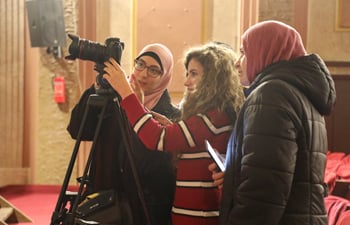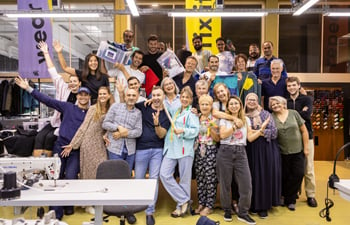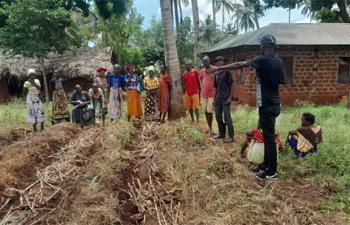It is generally accepted practice that whoever has the money decides what it is spent on. At DOEN we always ask ourselves whether our way of working best suits what we want to achieve and what our partners have in mind. So, over the last year, we have been experimenting with Participatory Grantmaking (PGM), in other words handing over decision-making on the distribution of the budget. The final report of this pilot study is available for download. We will share the most important learning points below.
Empowering pioneers
DOEN strives for a world based on a circular economy, where everyone counts, where community comes first, and where there is room for radical imagination. Yet social transitions do not happen by themselves. They require pioneers who show how things can be done differently and who are an inspiration for others. DOEN wants to be a driver of such pioneers. This requires an approach that strengthens mutual relationships and empowers the pioneers, enabling them to jointly set priorities and determine where energy should be invested.
Leaving decision-making to pioneers
That's why over the past year we've been experimenting with ways in which we can leave decision-making as to how our contributions are spent more to the pioneers and pioneer collectives, who are the people that ultimately matter. This is called Participatory Grantmaking in international jargon. Actually, in this, the funder often continues to determine the rules for decision-making. However, DOEN chose not to keep this process within the organisation, but to transfer it to collectives of pioneers who are actively involved in the same transition or share the same social mission. The collective took ownership of the process, and that process could continue in the future with money from other funds or from other sources. This creates space within the collective for continuity in collaborating on transitions.
The pilot study
The three partners with whom we completed the pilot study were the StadmakersCoöperatie, a Dutch network of city makers, Bakkerij de Eenvoud, a collective of artists and bakers, and Coöperatie Ondergrond, a collective of food forest pioneers. Each partner received a budget from DOEN that could be divided among the three collectives as they saw fit. How they did that can be read in the final publication. In the pilot study, DOEN deliberately left as much room as possible for the collectives to determine how the money was distributed, and did not want to play a role in the decisions. It was an open and informal process.
Lessons learned
The approaches and amounts chosen by the partners differed. Afterwards, the lessons learned were shared. Perhaps the best summary is Bakkerij de Eenvoud's observation that “sharing out cash is a completely different dynamic to reaching substantive consensus”. In the case of fund and grant applications, the applicant follows the path set out by the lender, including the substantive requirements for the application. This regularly results in applications being awarded to the theme, question and priorities defined by the fund. But these are not necessarily the proposals that a collective of pioneers themselves consider the most desirable. Things change when the money becomes available to be distributed within the collective through Participatory Grantmaking. The dynamics in the collective change, and this is reflected in at least three ways:
- Urgency. The availability of a budget that can be distributed forces the members of the collective to think in other ways about the activities to be undertaken and about what is important and feasible for the collective.
- Trust. Participatory Grantmaking increases the importance of mutual trust. This involves both trust between pioneers and the bond of trust between pioneers and their collective.
- Values. For all partners in the pilot study, a self-distributable budget contributed to working on shared values in two respects. Firstly, as a positive impetus to have discussions within one's own collective about what connects pioneers. Secondly, as a 'compass' for joint decision-making on which proposals are or are not eligible for funding.
Building blocks for a workable approach
The pilot study resulted in a number of building blocks for a workable approach that can be used by DOEN and other funds. These are principles that will help DOEN and the pioneers with whom DOEN collaborates to work even more decisively on positive change around us:
- We start from a clear shared expectation.
- We apply a small set of conditions with the following components:
- We work with a focus on intentions rather than on the basis of very detailed conditions and requirements;
- The pioneers decide how the budget is divided;
- We regularly exchange learning experiences and we learn together.
- We inspire each other througout the entire collaboration.
- We work towards a committed relationship on both sides, characterised by:
- A mutually open and curious attitude;
- A safe space. Leaders of collectives need a setting in which they can approach DOEN (and each other) in an informal way with any questions and dilemmas they may encounter;
- There is reporting during the process. This reporting is not an exercise in hindsight, but takes shape in the contact and experiences during the process.
With the insights gained over the past year and the knowledge we already had of Participatory Grantmaking, DOEN intends to continue to learn about – and be open to – new and alternative forms of funding, focusing on a more equal relationship between funders and beneficiaries.
Want to know more? Download the full final report here (in Dutch).


